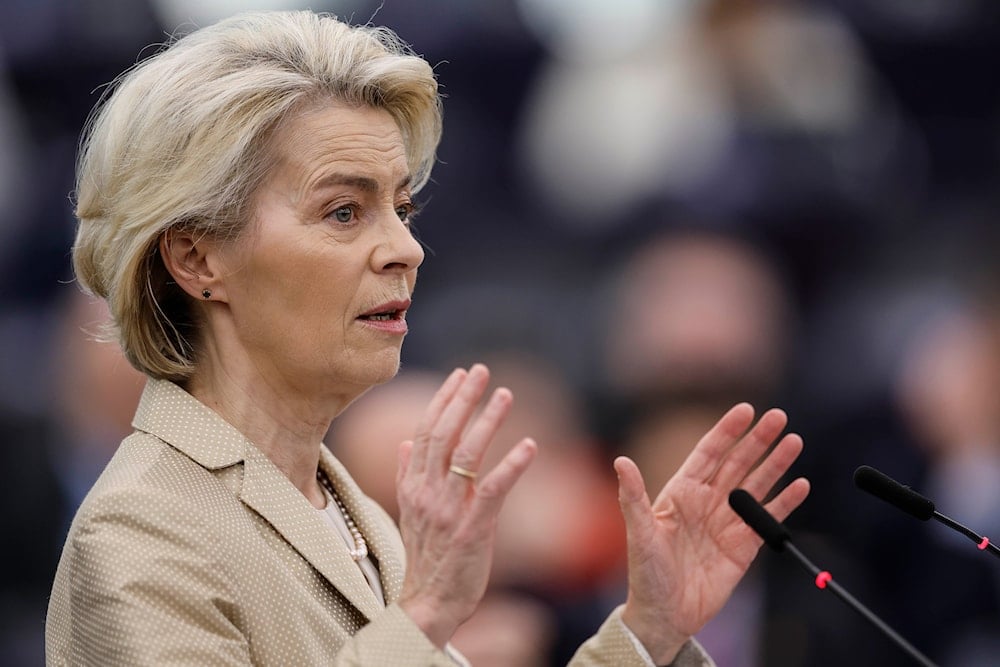Von der Leyen-backed EU group plans migration reforms à la Rwanda
The EPP urges for a deal with non-EU countries to deport illegal migrants for asylum processing in “safe” third countries.
-

European Commission President Ursula von der Leyen delivers her speech on security and defense at the European Parliament in Strasbourg, France, Wednesday, Feb. 28, 2024 (AP)
In a tense week ahead of the European Parliament elections in May, the European People’s Party (EPP), a coalition group of center-right and conservative parties backed by the head of the European Commission Ursula von der Leyen, is calling for more migration reforms to avert the rise of the far right.
Von der Leyen, who is running for a second term, will be formally selected as the EPP’s official candidate for the European Commission presidency in a vote in Romania on Thursday.
In its manifesto, the EPP urges for a deal with non-EU countries to deport illegal migrants for asylum processing in “safe” third countries, as it advocates for a fundamental change in European asylum law to be discussed at the EPP’s annual congress in Romania today. The proposed plan is similar to the UK's Rwanda-style policy.
The EPP consists of center-right parties across Europe, including government parties in Greece, Poland, Ireland, Latvia, Croatia, Lithuania, Sweden, Romania, Finland, and Luxembourg.
“We want to implement the concept of safe third countries. Anyone applying for asylum in the EU could also be transferred to a safe third country and undergo the asylum process there,” the manifesto said, noting that the “criteria for safe countries shall be in line with the core obligations of the Geneva Refugee Convention and the European convention on human rights” - as it tries to separate itself from the UK’s controversial Rwanda policy.
Read next: Von der Leyen: Global order at biggest risk since WWII
It claims that neither of the conventions “include the right to freely choose the country of protection.”
After the “implementation of the third country concept," it suggests the EU “admit a quota of people in need of protection through annual humanitarian quotas of vulnerable individuals”.
'Driving socialists mad'
Still, stricter migration reforms will potentially bring up tensions within parliament and create foreign political risks for von der Leyen.
One insider in Brussels said, “The socialists will go mad with this," referring to the second-biggest voting bloc in the European parliament.
Sophie in ‘t Veld, a Dutch MEP and the lead representative for the liberal Renew group on the parliament committee for civil liberties, justice, and home affairs, said, “Yet another unsavoury EPP chunk of red meat, meant to attract the far-right vote. It will not work. All the EPP strategy has achieved over the past years, is making the far right bigger. So if they know it doesn’t work, why do they stubbornly repeat the same tactics each time?”
“I don’t think she will have any difficulty among member states, but the parliamentary vote is another game altogether,” said another diplomat.
This has stirred up controversial similarities to the UK's Rwanda policy, in which the United Kingdom and Rwanda signed a migration agreement in 2022, under which people identified by the UK government as undocumented migrants or asylum seekers would be deported to Rwanda for processing, asylum, and resettlement.
The plan has drawn criticism from human rights organizations and some politicians who believe the measure will not help stem the flow of migrants. Rwanda announced that it has the capacity to process only 1,000 asylum seekers over the first five years, which raises concerns regarding the practicality of the bill.
Back in September, EU foreign chief Josep Borrell said that migration might be "a dissolving force for the EU" because of significant cultural differences between European nations and their long-term incapacity to adopt a single strategy.

 4 Min Read
4 Min Read








